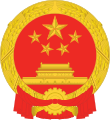National Nuclear Safety Administration (Chinese: 国家核安全局) or NNSA is a central government agency responsible for regulating nuclear safety, supervision on all civilian nuclear infrastructure in China. It also inspects nuclear safety activities and regulate the approval mechanism.[2]
| 国家核安全局 | |
 | |
 | |
| Regulatory agency overview | |
|---|---|
| Formed | October 1984 |
| Type | Nuclear safety |
| Jurisdiction | |
| Headquarters | No. 12 of East Chang'an Street, Dongcheng District, Beijing |
| Minister responsible |
|
| Deputy Ministers responsible |
|
| Parent department | Ministry of Environmental Protection[1] |
| Parent Regulatory agency | State Council |
| Website | nnsa |
History
editThe National Nuclear Safety Administration (1984–1989) was established in October 1984. It was a subordinate agency of the State Science and Technology Commission which had independent regulatory of nuclear safety in mainland China.[1]
In 1990, the State Science and Technology Commission became the National Science and Technology Commission but National Nuclear Safety Administration was still under its administration until 1998.[citation needed]
In 1998 the National Nuclear Safety Administration was transferred to the State Environmental Protection Administration.[1]
In 2008, the State Environmental Protection Administration was upgraded to a full ministry of the Chinese state called the Ministry of Environmental Protection and the National Nuclear Safety Administration was retained under its administrative purview.[1]
In 2017, new laws strengthened the powers of the NNSA, creating new "institutional mechanisms", a clearer "division of labour" and more disclosure of information.[3]
See also
edit- China National Nuclear Corporation – Chinese state-owned enterprise
References
edit- ^ a b c d "国家核安全局简介". Archived from the original on 2012-05-02. Retrieved 2012-03-26.
- ^ "China". Archived from the original on 2011-07-27. Retrieved 2012-03-26.
- ^ Stanway, David (1 September 2017). "China's legislature passes nuclear safety law". Reuters. Retrieved 1 September 2017.
External links
edit- Official website (in Chinese)